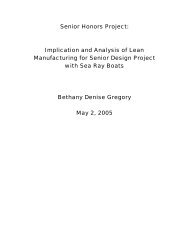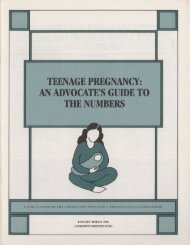child care - Digital Library Collections
child care - Digital Library Collections
child care - Digital Library Collections
You also want an ePaper? Increase the reach of your titles
YUMPU automatically turns print PDFs into web optimized ePapers that Google loves.
THE STATE OF AMERICA'S CHILDREN YEARBOOK 1998<br />
reform efforts, has dramatically increased the<br />
number of families combining welfare with work.<br />
In October 1993 a mere 6.9 percent of the<br />
caseload-14,144 families-had earnings; by August<br />
1997 that number jumped to 39,795 families, or<br />
25.4 percent of the caseload. Furthermore, 95 Illinois<br />
counties reported that at least 30 percent of<br />
their TANF families were working in 1997; not a<br />
single county had such a high proportion three<br />
years before. The state's willingness to provide a<br />
wage supplement based on each family's need and<br />
work effort, and not on an arbitrary time limit,<br />
seems to be putting more families on the track to<br />
employment and self-sufficiency.<br />
Moving Forward: A 1998 Agenda<br />
for Action<br />
Anumber of concrete steps can be taken to lift<br />
<strong>child</strong>ren out of poverty. Parents need the tools<br />
to get and keep jobs, and families need income<br />
supports when jobs do not pay enough to make<br />
ends meet. Even in a thriving economy, some families<br />
live in areas where work is not available and<br />
jobs must be created. Other parents simply cannot<br />
work, either temporarily or permanently, because<br />
of their disability or their <strong>child</strong>'s. Not every family<br />
has the same needs, of course. Literacy training is<br />
a priority for some; others may need the chance to<br />
fInish college. Many require subsidized <strong>child</strong> <strong>care</strong>;<br />
others have to fInd a way to get to work. For some,<br />
cash aid is essential to keep their <strong>child</strong>ren from<br />
destitution.<br />
Eliminating <strong>child</strong> poverty is critical on grounds<br />
of humanity and compassion, but it is imperative,<br />
too, as an investment in our economic future. What<br />
actions can make a real difference in the lives of<br />
<strong>child</strong>ren and families?<br />
• Families need access to good jobs and the supports<br />
that make work possible. Federal and<br />
state governments should invest in <strong>child</strong> <strong>care</strong><br />
and transportation so that parents can get to<br />
work and know that their <strong>child</strong>ren are safe and<br />
nurtured. Mothers, especially those escaping<br />
from abusive situations, may need counseling,<br />
treatment for depression, or help in recovering<br />
from substance abuse before they can perform<br />
at work.<br />
• Parents need education and training as a<br />
means to compete for jobs with good pay. The<br />
federal government should give states the<br />
flexibility to count training or education as an<br />
allowable work activity, because every year of<br />
education improves the family's chance of rising<br />
out of poverty. Federal financial aid<br />
should expand on the work-study model to<br />
offer stipends to parents trying to upgrade<br />
their employment potential. Businesses<br />
should follow the recommendation of the National<br />
Association of Manufacturers and invest<br />
between 3 and 5 percent of payroll on<br />
employee training.<br />
• Children should be able to count on the support<br />
of both parents. States should eliminate<br />
the disincentives for marriage that linger from<br />
the old welfare system, dropping the rules that<br />
made it harder for two-parent families to qualify<br />
for aid. When parents cannot stay together,<br />
the absent parent should pay <strong>child</strong> support.<br />
States should act quickly to automate their<br />
<strong>child</strong> support enforcement systems, to register<br />
newly hired employees, and to use other enforcement<br />
tools to improve on the current dismal<br />
collection record.<br />
• States should pilot <strong>child</strong> support assurance<br />
programs. Under such programs, the state<br />
makes vigorous efforts to collect support from<br />
the absent parent. If no support payments can<br />
be obtained, however, the state pays a base<br />
amount per <strong>child</strong> that provides a sure source of<br />
income and, when combined with the custodial<br />
parent's earnings, offers families a far<br />
greater chance to escape from poverty.<br />
• The minimum wage should be raised until a<br />
full-time minimum wage job pays at least<br />
enough to support a family of three above the<br />
poverty line, as it did during most of the 1960s<br />
and 1970s.<br />
• States should enact their own Earned Income<br />
Tax Credits, as nine states already have. Massachusetts,<br />
Minnesota, New York, Vermont, and<br />
14 CHILDREN'S DEFE SE FU D














